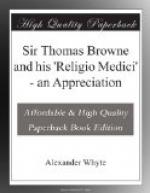unchurch or ostracise any other man. He does
not stand at diameter and sword’s point with
any other man; no, not even with his enemy.
He has never been able to alienate or exasperate himself
from any man whatsoever because of a difference of
an opinion. He has never been angry with any
man because his judgment in matters of religion did
not agree with his. In short he has no genius
for disputes about religion; and he has often felt
it to be his best wisdom to decline all such disputes.
When his head was greener than it now is, he had a
tendency to two or three errors in religion, of which
he proceeds to set down the spiritual history.
But at no time did he ever maintain his own opinions
with pertinacity: far less to inveigle or entangle
any other man’s faith; and thus they soon died
out, since they were only bare errors and single lapses
of his understanding, without a joint depravity of
his will. The truth to Sir Thomas Browne about
all revealed religion is this, which he sets forth
in a deservedly famous passage:—’Methinks
there be not impossibilities enough in revealed religion
for an active faith. I love to lose myself in
a mystery, and to pursue my reason to an O altitudo!
’Tis my solitary recreation to pose my apprehension
with those involved enigmas and riddles of the Trinity,
with incarnation and resurrection. I can answer
all the objections of Satan and my rebellious reason
with that odd resolution I learned of Tertullian,
Certum est quia impossibile est. I desire
to exercise my faith in the difficultest point; for
anything else is not faith but persuasion. I
bless myself, and am thankful that I never saw Christ
nor His disciples. For then had my faith been
thrust upon me; nor should I have enjoyed that greater
blessing pronounced to all that believe and saw not.
They only had the advantage of a noble and a bold
faith who lived before the coming of Christ; and who,
upon obscure prophecies and mystical types, could raise
a belief and expect apparent impossibilities.
And since I was of understanding enough to know that
we know nothing, my reason hath been more pliable
to the will of faith. I am now content to understand
a mystery in an easy and Platonic way, and without
a demonstration and a rigid definition; and thus I
teach my haggard and unreclaimed reason to stoop unto
the lure of faith.’ The unreclaimed reader
who is not already allured by these specimens need
go no further in Sir Thomas Browne’s autobiographic
book. But he who feels the grace and the truth,
the power and the sweetness and the beauty of such
writing, will be glad to know that the whole Religio
is full of such things, and that all this author’s
religious and moral writings partake of the same truly
Apostolic and truly Platonic character. In this
noble temper, with the richest mind, and clothed in
a style that entrances and captivates us, Sir Thomas
proceeds to set forth his doctrine and experience of
God; of God’s providence; of Holy Scripture;




